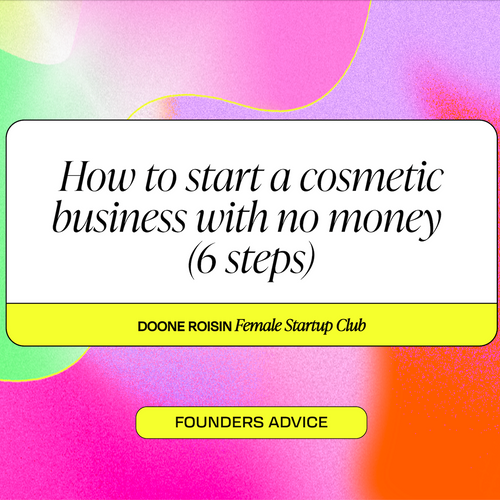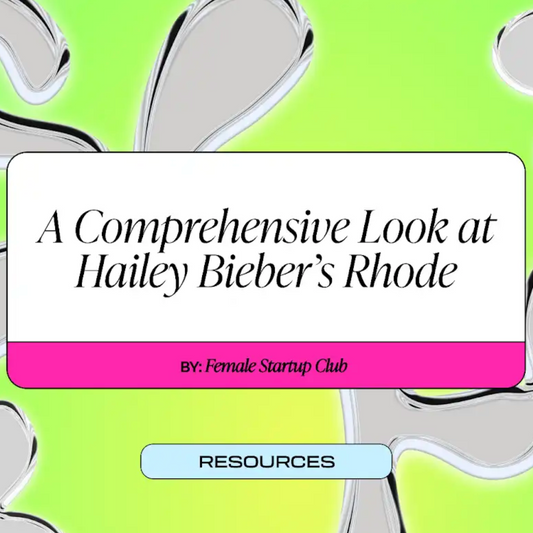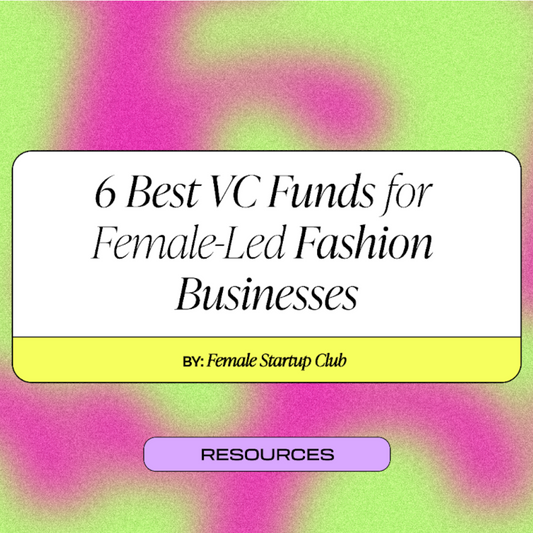Joining me on this episode is Tracy Dubb, Co-Founder of Isla Beauty.
Isla Beauty was created to make the best products at the best price, from people who know the industry inside and out. They leverage global relationships to create hybrid products that serve multiple purposes, using leading technology, science, and potent active ingredients - all for under fifty bucks.
In this episode we’re covering how Tracy built her company in partnership with a 4th generation manufacturer, the learnings she took from her VC background and how that formed her vision and business model for launching Isla and her learnings from along the way.

So, when it came time to raise funds, the choice was clear: invest heavily upfront in inventory and top-notch research and development partners. Yet, for anyone who's been through it, the decision to fundraise can feel daunting. There’s always that nagging sense of "Where do I even begin?" coupled with the emotional rollercoaster of figuring things out on your own and navigating countless setbacks.
The Emotional Toll of Fundraising
The process of raising funds is not just a financial challenge; it's an emotional one, too. Pitching your young business can be lonely, especially when you're constantly fielding questions and facing rejections. The founders of ISLA learned firsthand how tough it is to get through meetings where investors poke holes in your vision, often leaving you to feel vulnerable and exposed. The best piece of advice they offer? Get your business in the best possible shape before fundraising. Be ready to answer the tough questions, prepare for the emotional toll, and, most importantly, anticipate setbacks. Even when you're ready to raise money, keep the scrappy, bootstrapping mentality alive—it's healthy for a young brand and helps keep you grounded.
The Fundraising Experience
When ISLA was ready to seek external funding, the founders started with a friends-and-family round, which was supplemented by a few funds. The fundraising journey included meetings with people they’d known for years and those they were introduced to for the first time. By the end of it, the most valuable lesson they learned was how the voices of those investors could stay in their heads long after the meetings ended. Some feedback was constructive, while other criticisms felt irrelevant or even offensive.
Their approach? Give all feedback a fair shot. Think it over and decide whether it has merit for the business. At the same time, the founders stressed the importance of staying true to ISLA’s vision. While it’s natural to consider the advice of others, you have to draw a line and stay committed to your brand’s core values rather than molding it to fit someone else's idea of what it should be.
How ISLA Came to Be
The story of how ISLA came together is one of serendipity and complementary skills. The founders, who initially met by chance, soon realized they could make a great team. Within a few months, they had decided to launch a business together, and the process snowballed quickly from there. They began with brand meetings, brainstorming product ideas, and lining up potential partners. While it took about six to nine months to finalize the decision to officially become co-founders, the actual product development timeline stretched over a year.
But that year was incredibly efficient. With the help of seasoned supply chain experts and logistics partners who had generations of experience in the beauty industry, ISLA was able to launch its product line faster than most brands could dream of. For them, the expedited timeline was possible because of the experienced professionals they partnered with—family businesses that had been perfecting their craft for decades.
The Reality of Launching a Beauty Brand
Starting a beauty brand is no cheap endeavor. Even for companies that launch with just a few products, the initial costs can be daunting. According to the founders, a couple hundred thousand dollars is often needed just to get to the point where you can begin fundraising. That money usually goes toward flushing out the brand identity, developing early prototypes, and establishing relationships with suppliers.
Launching with three products may sound manageable, but when it comes to beauty, it's an indication that significant investment has already been made. After all, if you see a brand debut with a full line of products, you can bet there’s substantial money behind it. The reality is, creating high-quality products and packaging, not to mention shipping them worldwide, is expensive. It’s one reason why many beauty brands start small and gradually expand.
The Launch Plan vs. Reality
Originally, ISLA's launch strategy revolved around in-person events in New York City. They wanted to build buzz through intimate, face-to-face interactions and local activations, allowing people to see and feel the brand up close. The plan was to tap into New York's influential circles and use early adopters as micro-amplifiers, spreading the word about ISLA within their own communities. Instead of chasing big-name influencers, they aimed to empower everyday people who were truly passionate about their mission to become advocates.
However, when the pandemic hit, they had to pivot. Gone were the plans for in-person activations, replaced by a more organic, online launch. They chose not to rely heavily on traditional press or paid advertising. Instead, they quietly went live, letting the brand speak for itself and trusting that if the products were as good as they believed, word of mouth would follow. And it did. Customers found ISLA, fell in love with the products, and shared their experiences.
Adapting in the Face of Challenges
Building a beauty brand is challenging under normal circumstances, but launching during a global crisis took those difficulties to a whole new level. Despite the setbacks, the founders remained focused on their mission. They saw the pandemic not as a roadblock but as an opportunity to rethink their approach. At the end of the day, sometimes you just have to "go into business one day and start learning," as they put it.
The ISLA journey is a testament to the power of resilience, smart pivots, and staying true to your brand’s mission. Whether you’re an aspiring entrepreneur or just someone curious about the behind-the-scenes of building a beauty brand, their story is a reminder that the road to success is often bumpy—but also incredibly rewarding.



